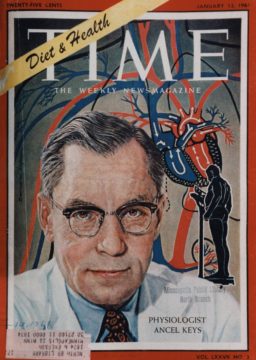Natalie Healey in Scientific American:
 Landmark studies such as these laid the groundwork for the introduction of dietary guidelines in the United States and the United Kingdom during the 1970s and 1980s. The recommendations advised citizens to reduce their consumption of saturated fat to about 10% of their total energy intake, to lower cholesterol in the blood and therefore decrease the chances of a heart attack. In the public consciousness, a low-fat diet has been synonymous with good health ever since.
Landmark studies such as these laid the groundwork for the introduction of dietary guidelines in the United States and the United Kingdom during the 1970s and 1980s. The recommendations advised citizens to reduce their consumption of saturated fat to about 10% of their total energy intake, to lower cholesterol in the blood and therefore decrease the chances of a heart attack. In the public consciousness, a low-fat diet has been synonymous with good health ever since.
Uffe Ravnskov, a Danish independent researcher based in Lund, Sweden, dismisses the relationship between dietary fats, cholesterol and coronary heart disease, calling it “the greatest medical scandal in modern time”. Critics such as Ravnskov say data points in Keys’ Seven Countries Study were cherry-picked to fit the conclusion. For instance, Keys did not include data from France, where the occurrence of heart disease was comparatively low at the time despite the nation’s high-fat diet. Ravnskov’s The International Network of Cholesterol Skeptics, which has around 100 members—some of them cardiologists—says millions of people have been “badgered” into eating a “tedious and flavorless diet” out of fear for their hearts.
More here.
